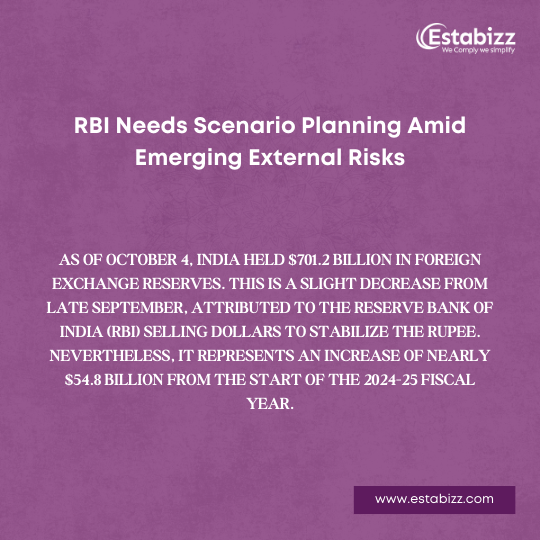RBI Needs Scenario Planning Amid Emerging External Risks
Current State of India’s Foreign Exchange Reserves
As of October 4, India held $701.2 billion in foreign exchange reserves. This is a slight decrease from late September, attributed to the Reserve Bank of India (RBI) selling dollars to stabilize the rupee. Nevertheless, it represents an increase of nearly $54.8 billion from the start of the 2024-25 fiscal year.

Key Points:
- Foreign Exchange Reserves: $701.2 billion as of October 4.
- Recent Activity: Slight dip due to RBI selling dollars to stabilize the rupee.
- Yearly Increase: Nearly $54.8 billion more than at the start of 2024-25.
Historical Context and Present Geopolitical Challenges
Our memories of the 1991 forex crunch and the Asian Crisis of 1997 may have conditioned us to view a growing reserve as a security blanket. However, current global geopolitical conditions necessitate a more nuanced approach.
Benefits of Large Foreign Assets:
- Import Payments: Ensures the ability to pay for imports.
- Currency Stability: Provides the RBI with tools for maintaining currency stability.
- Investor Confidence: Bolsters confidence in the country’s solvency, making foreign funds more accessible.
- Policy Autonomy: Eliminates the need for loans from multilateral lenders, offering policy independence.
Investment Realities:
- Low-Yield Bonds: Most reserves are invested in low-yield bonds like US Treasuries, yielding minimal returns.
New Risks:
- Geopolitical Targets: Forex reserves are now seen as potential geopolitical targets, especially after the freezing of Russia’s $300 billion holdings in 2022.
The Need for New Scenario Planning
In light of evolving global dynamics, the RBI must engage in comprehensive scenario planning. Economist Barry Eichengreen categorizes forex strategies into two orientations: Mercury and Mars.
Strategic Orientations:
- Mercurian Strategy: Holds foreign currencies in ratios that satisfy trade and payment needs.
- Martian Strategy: Aligns holdings with a geopolitical calculus.
Strategic Imperatives:
- US Influence: RBI should consider the implications of potential shifts in US leadership and policy, such as a possible Donald Trump presidency.
- Global Risks: Potential setbacks to globalization, reciprocal tariffs, and attempts to “de-dollarize” trade.
Potential Challenges and RBI’s Stance
A weaker dollar aimed at making US exports more competitive could trigger a currency war, affecting global exchange rates, including the rupee.
Potential Risks:
- Currency War: Actions aimed at China could have broader impacts, potentially exacerbating currency volatility globally.
- Currency Manipulation Allegations: India could be labeled as a currency manipulator, as seen before.
RBI’s Position:
- Market Intervention: The RBI intervenes to manage volatility, not to peg the rupee at a specific level.
- Trade Impact: Dollar accretion reflects investment flows and remittances rather than export earnings, minimizing distortion in trade.
- Inflation Targeting: RBI’s focus on inflation limits its ability to defend a currency peg without compromising price stability.
Trade-offs and Future Actions
Balancing external and internal currency stability grants RBI some operational flexibility but restricts the ability to use a weak rupee as a trade strategy.
Operational Dynamics:
- Liquidity Management: Buying dollars releases rupees into the system, necessitating bond sales to manage inflation.
- Gentle Slide: Recent currency depreciation to under ₹84 per dollar has been gradual.
Proactive Measures:
- Shielding Exports: Incentives may be necessary to protect exports from an overvalued rupee without triggering inflation.
Conclusion and Future Outlook
India’s forex reserves are robust, and while they represent a significant financial buffer, evolving geopolitical realities necessitate strategic vigilance and proactive scenario planning. The Reserve Bank of India (RBI) must remain agile in managing these reserves while balancing trade and inflation considerations.
Preparedness is Key
It’s evident that:
- Geopolitical Shifts: The global financial landscape is increasingly influenced by geopolitical maneuvers, requiring the RBI to stay ahead of possible disruptions.
- Adaptive Strategy: A balance between Mercurian and Martian strategies could provide a comprehensive approach to managing reserves amid changing international relations.
- Inflation Control: Ensuring domestic price stability while managing forex reserves demands keen oversight and strategic intervention, especially with varying US policies that could impact global currencies.
Empowering Businesses in a Dynamic Financial Environment
Estabizz Fintech understands the intricate challenges that businesses face in today’s global economy. We are committed to providing the expertise and support necessary to navigate financial compliance and foster international expansion. With our deep understanding and global reach, we offer services that encompass local expertise across numerous countries, ensuring your business thrives, regardless of where you operate.
How Estabizz Fintech Can Help:
- Global Financial Advisory: Expert advice on international financial regulations and compliance to ensure your business stays ahead.
- Risk Management: Strategic insights and tools to manage and mitigate financial risks influenced by geopolitical developments.
- Market Expansion: Tailored strategies to facilitate seamless international growth and expansion into new markets.
- Currency Stability: Guidance on managing currency risks to protect your business from volatility in the forex market.
Our holistic approach ensures that you are well-prepared to handle financial uncertainties, optimize your financial operations, and achieve sustainable growth.
Summarized Key Takeaways:
- Robust Reserves: India’s forex reserves are strong but require nuanced management amid global uncertainties.
- Strategic Vigilance: The shifting geopolitical landscape necessitates a proactive and adaptive strategy.
- Balancing Act: Maintaining a balance between currency stability and inflation control is crucial for sustained economic health.
- Empowering Businesses: With Estabizz Fintech’s global expertise, businesses can confidently navigate financial complexities and achieve international success.
- Robust Reserves: India’s foreign exchange reserves are substantial but must be strategically managed.
- Geopolitical Preparedness: New geopolitical risks require thoughtful scenario planning.
- RBI’s Dual Mandate: Balancing currency stability and inflation is critical.
Estabizz Fintech compiled the material in this article using the most recent Acts, Rules, Circulars, Notifications, Provisions, Press Releases, and material applicable at the time. They ensured the completeness and correctness of the material through due diligence. When using this material, users must consult the relevant, applicable legislation. The given data may change without prior notice and does not constitute professional advice. Estabizz Fintech disclaims all liability for any results from the use of this material.




